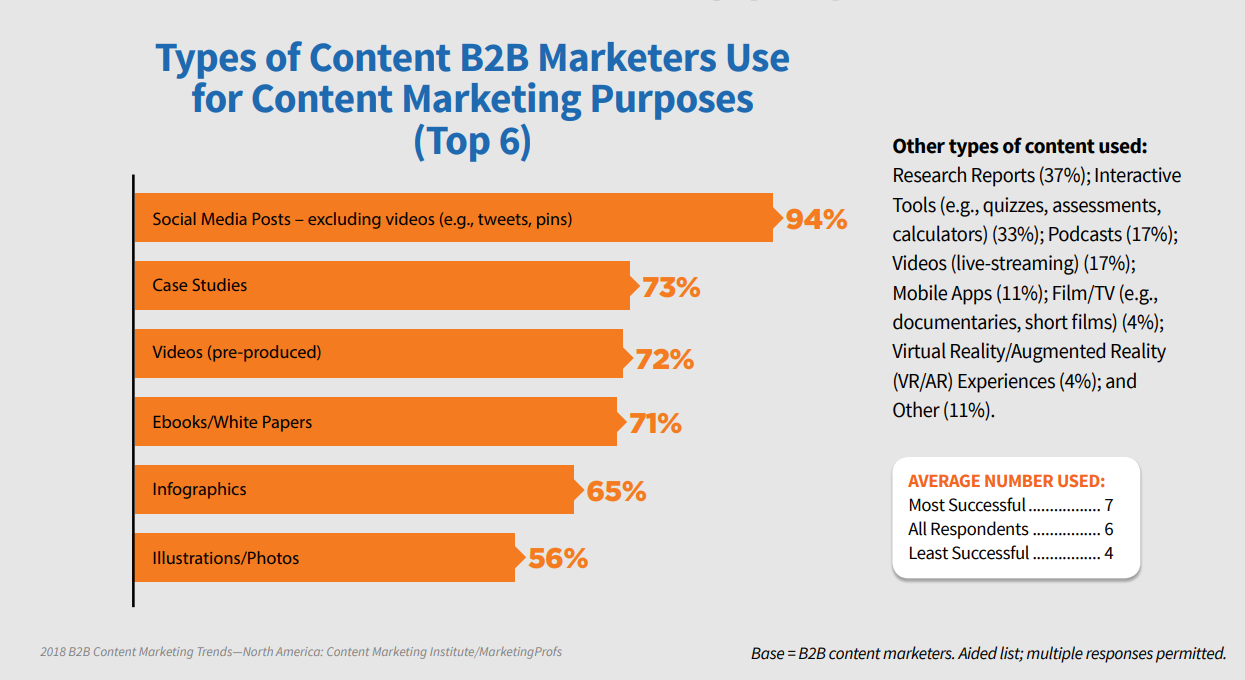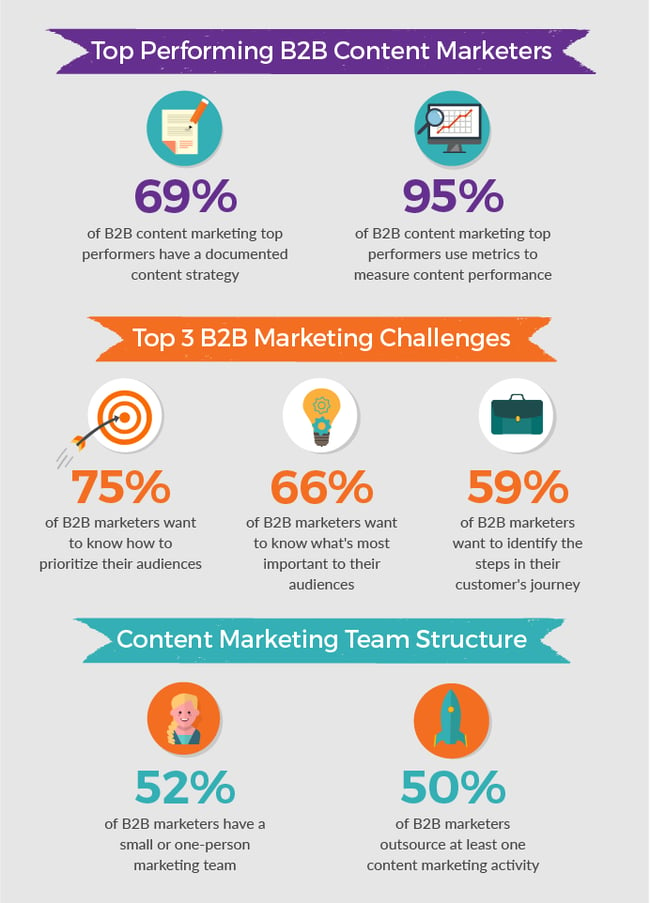B2B content marketing strategies focus on providing valuable, relevant content to attract and engage target audiences. Effective strategies include understanding buyer personas and utilizing various content formats like blogs, videos, and webinars.
In the competitive landscape of B2B marketing, creating compelling content is crucial for success. Businesses must prioritize understanding their audience’s needs and preferences. Tailoring content to address specific challenges fosters trust and drives engagement. Utilizing diverse formats enhances reach and adaptability.
Blogs can educate, while videos can simplify complex information. Webinars allow for direct interaction and deeper insights. Regularly analyzing performance metrics helps refine strategies and optimize results. By implementing these strategies, businesses can establish authority and nurture lasting relationships with clients, ultimately driving growth and profitability.
The Essence Of B2b Content Marketing
B2B content marketing focuses on building relationships. It is different from B2C marketing. B2B targets businesses, while B2C targets consumers. The goal is to generate leads and build trust.
Content must be valuable and informative. This helps businesses make informed decisions. B2B marketing often uses whitepapers, case studies, and webinars. These tools educate potential clients.
In the sales funnel, content guides prospects. It helps them move from awareness to decision-making. Effective content can significantly increase conversion rates. It creates a strong foundation for long-term partnerships.

Credit: rockcontent.com
Setting Clear Marketing Goals
Setting clear marketing goals starts with understanding your audience. Knowing who they are helps create effective content. Identify key demographics such as age, location, and job roles. This information shapes your content strategy.
Align content with business objectives. Each piece should support your overall goals. Use relevant keywords to attract the right audience. Create content that solves problems for your target audience. This builds trust and authority in your industry.
Regularly review and adjust your strategies. Keep track of what works and what doesn’t. This ensures your content remains relevant and impactful.
Crafting A Content Marketing Plan
Creating a strong content marketing plan is essential for success. Key components include defining your audience and setting clear goals. Each part of the plan should align with your overall strategy.
Budget considerations play a crucial role. Determine how much you can spend on content creation and distribution. Identify necessary resources such as tools and team members. Proper planning helps avoid overspending.
Consider investing in training for your team. This can improve skills and boost creativity. Use tools that can help streamline processes and enhance productivity. Having a well-defined budget ensures effective resource allocation.
Content Types That Drive B2b Sales
White papers and e-books are powerful tools for B2B marketing. They provide in-depth knowledge on specific topics. These resources help establish authority and trust with potential clients. Readers appreciate valuable information that solves their problems.
Case studies show real-world examples of success. They highlight how your products or services solve challenges. Testimonials from satisfied clients add credibility. Positive feedback helps build trust and encourages new customers to engage.
| Content Type | Benefits |
|---|---|
| White Papers | Establish authority and provide in-depth insights. |
| E-books | Offer valuable knowledge and engage readers. |
| Case Studies | Demonstrate success through real examples. |
| Testimonials | Build trust through positive client feedback. |
Leveraging Seo For B2b Audiences
Effective keyword research is vital for B2B content marketing. Start by identifying industry-specific terms that potential customers use. Utilize tools like Google Keyword Planner and SEMrush to find relevant keywords.
Focus on long-tail keywords. They often have less competition and more targeted traffic. Analyze your competitors’ keywords to uncover new opportunities.
Consider the search intent behind keywords. Understand what users seek when they search. This will help create content that meets their needs.
Optimize your content with chosen keywords. Place them in titles, headings, and throughout the text. This practice boosts your SEO rankings significantly.
Regularly update your keyword list. Trends change, and staying current is essential. This keeps your content relevant and engaging.
Effective Distribution Channels
Choosing the right social media platforms is vital for B2B success. Focus on platforms where your audience spends time. LinkedIn is great for professionals. Facebook can help with broader outreach. Twitter allows quick updates and engagement. Analyze user demographics before selecting a platform.
Email marketing strategies can boost engagement. Create targeted email lists based on interests. Use compelling subject lines to increase open rates. Segment your audience for personalized content. Regular newsletters keep your brand top-of-mind. Track performance metrics to improve future campaigns.
Measuring Content Marketing Success
Measuring content marketing success is vital for B2B strategies. Key Performance Indicators (KPIs) help track effectiveness. Common KPIs include:
- Website traffic
- Lead generation
- Conversion rates
- Engagement metrics
- Social shares
Using the right tools makes tracking easier. Popular tools for tracking and analytics are:
| Tool | Purpose |
|---|---|
| Google Analytics | Website traffic and user behavior |
| HubSpot | Lead tracking and marketing automation |
| SEMrush | SEO and content performance |
| BuzzSumo | Content engagement and social shares |

Credit: www.clariantcreative.com
Scaling Your Content Marketing Efforts
Automation helps streamline content distribution. It saves time and boosts efficiency. Tools like Hootsuite and Buffer can schedule posts across platforms. This ensures your content reaches a wider audience.
Creating a strong content marketing team is vital. Include roles like writers, designers, and strategists. Each person brings unique skills to the table. Regular meetings help everyone stay aligned. This teamwork leads to better results.
| Role | Responsibilities |
|---|---|
| Writer | Create engaging content |
| Designer | Make visuals appealing |
| Strategist | Plan and analyze campaigns |
Staying Ahead Of B2b Marketing Trends
New technologies and platforms play a big role in B2B marketing. Companies must stay updated on these changes. AI, chatbots, and automation help businesses connect better with clients. They can streamline communication and enhance customer experiences.
Buyer behaviors are changing fast. Many buyers prefer to research online before making decisions. This trend means companies need to create relevant and engaging content. Using social media and video marketing can attract new clients. Providing valuable information builds trust and credibility.
Understanding data analytics is essential. It helps track what content works best. Adjusting strategies based on this data can improve results. Always listen to customer feedback. This approach leads to better products and services.

Credit: www.linkedin.com
Case Studies: B2b Content Marketing Success Stories
Many industry leaders have succeeded through effective B2B content marketing. Case studies show how they engage their audience. They use storytelling to make connections and build trust.
One successful tactic is personalization. Tailoring content to specific needs increases engagement. Another strategy is creating valuable resources. E-books and guides attract potential clients and showcase expertise.
Leaders also emphasize data-driven decisions. Analyzing performance helps refine strategies. Consistent branding across channels strengthens recognition and loyalty.
| Strategy | Description |
|---|---|
| Storytelling | Creates emotional connections with the audience. |
| Personalization | Tailors content to meet specific audience needs. |
| Valuable Resources | Offers e-books and guides to showcase expertise. |
| Data-Driven Decisions | Uses analytics to refine marketing strategies. |
| Consistent Branding | Strengthens recognition across different channels. |
Frequently Asked Questions
What Are Effective B2b Content Marketing Strategies?
Effective B2B content marketing strategies include creating valuable, informative content that addresses your audience’s pain points. Use various formats like blogs, whitepapers, and videos. Leverage SEO to improve visibility. Engage with your audience through social media and email marketing. Measure results to refine your strategies.
How To Measure B2b Content Marketing Success?
To measure B2B content marketing success, track key performance indicators (KPIs) like website traffic, lead generation, and conversion rates. Use tools like Google Analytics for insights. Monitor engagement metrics on social media and email campaigns. Regularly analyze this data to optimize your strategies and improve future performance.
What Types Of Content Work Best For B2b?
The best types of content for B2B include case studies, industry reports, and blog posts. Whitepapers and eBooks are excellent for in-depth information. Webinars and podcasts offer interactive engagement. Tailor your content to address specific audience needs and challenges to maximize impact and effectiveness.
How Often Should B2b Content Be Published?
B2B content should be published consistently, ideally 1-2 times a week. This frequency helps maintain engagement and builds authority in your niche. However, quality should always take precedence over quantity. Ensure each piece of content provides value to your audience to foster trust and long-term relationships.
Conclusion
Effective B2B content marketing strategies drive engagement and build trust. Tailoring your content to meet the needs of your audience is crucial. Focus on delivering value through informative and relevant materials. By implementing these strategies, you can enhance your brand’s visibility and foster lasting relationships in the competitive B2B landscape.



